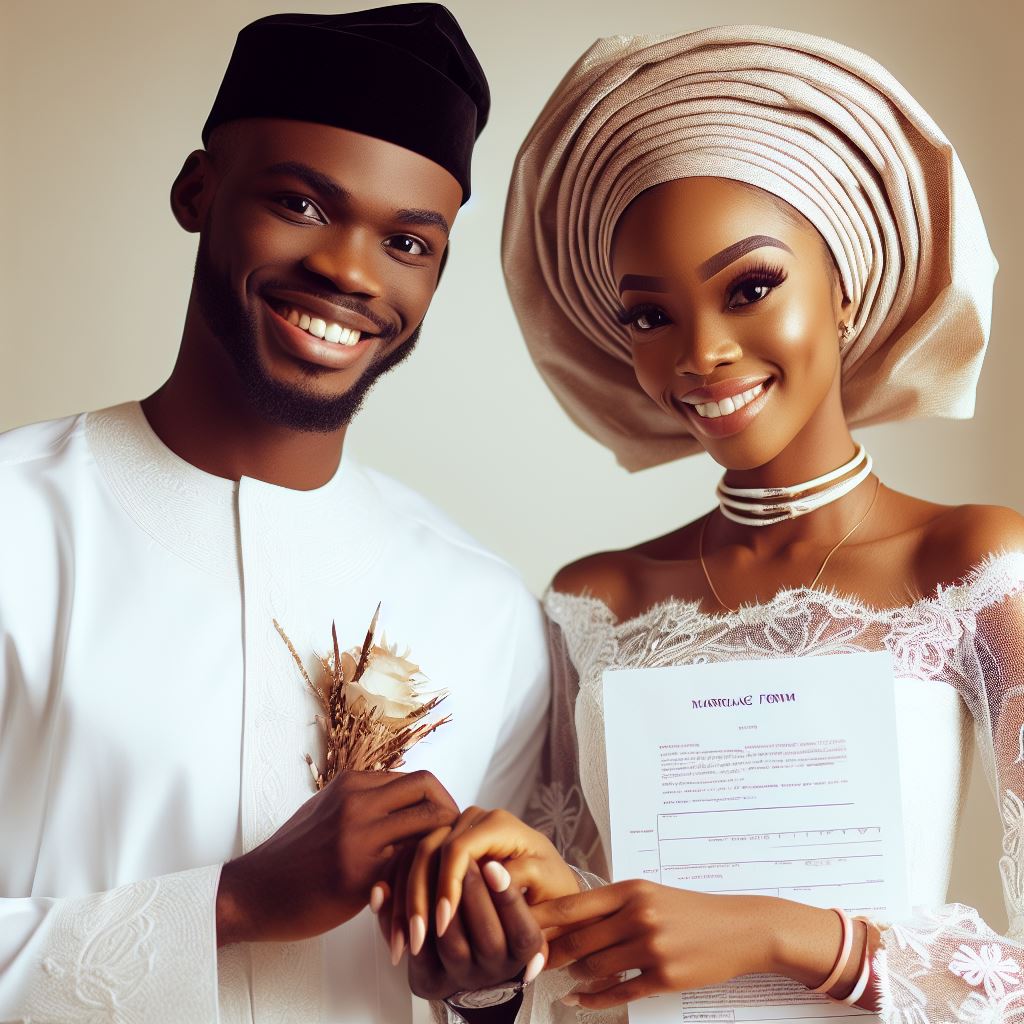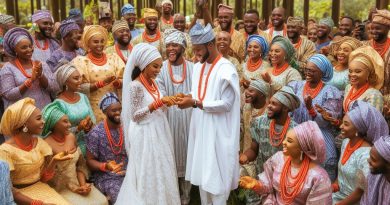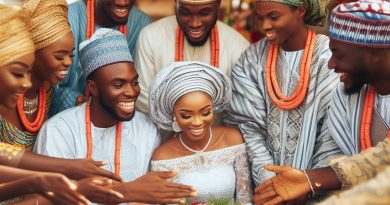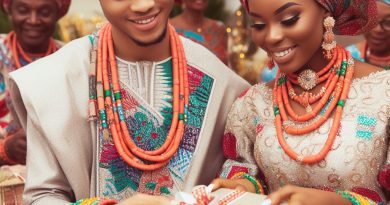FAQs: Answering Common Questions About Nigeria’s Marriage Form
Last Updated on January 28, 2024
Introduction
In this blog post, we will address common questions about Nigeria marriage form. We aim to provide a brief explanation of the topic and highlight the importance of addressing these inquiries.
Brief explanation of Nigeria’s marriage form
Couples must complete a legal document, Nigeria’s marriage form, before their marriage in Nigeria is recognized. It includes personal information, witnesses’ details, and important declarations.
Importance of addressing common questions and concerns
Addressing common questions and concerns about Nigeria’s marriage form is crucial for several reasons.
- First, it aids individuals in comprehending the legal requirements and procedures for marriage in Nigeria
- By providing clarity, potential couples can navigate through the procedures effectively and ensure compliance with the law.
- Moreover, addressing common questions can alleviate any confusion or anxiety couples may have, ensuring a smoother wedding planning experience.
- Additionally, clarification on common concerns related to Nigeria’s marriage form promotes transparency and trust in the system.
- It demonstrates the government’s commitment to making the marriage registration process accessible and understandable to all parties involved.
- By answering these questions, we can empower individuals with the knowledge they need to make informed decisions about their marriage.
- This understanding will also assist in avoiding potential legal complications that may arise due to inaccuracies or misunderstandings regarding the marriage form.
Overall, addressing common questions and concerns about Nigeria’s marriage form is essential for promoting a transparent, accessible, and hassle-free marriage registration process.
What is Nigeria’s marriage form?
Marriage in Nigeria is a significant event that involves a specific form to be followed. In this blog section, we will discuss the marriage form in Nigeria, its explanation, legal requirements, process, and the different types of marriages recognized in the country.
Explanation of Nigeria’s Marriage Form
- The marriage form in Nigeria is a document that officially registers a marriage between two individuals.
- It stands as legal evidence of the union and is necessary for purposes like name change, inheritance, immigration, and benefits.
Overview of Legal Requirements and Process
- Both parties must be at least 21 years old and provide valid identification documents to register for a marriage.
- The couple needs to obtain a marriage license from the local government registry or marriage registry office.
- They must give notice of their intention to marry at least 21 days before the wedding ceremony.
- Two witnesses who are at least 18 years old must be present during the ceremony and sign the marriage form.
- Following the wedding, couples submit the completed marriage form to the marriage registry for registration and certification
- It is essential to adhere to these legal requirements and follow the process to ensure the validity of the marriage.
Different Types of Marriages Recognized in Nigeria
- Customary Marriage: This is the traditional form of marriage in Nigeria, recognized by customary laws and practices of different ethnic groups.
- Statutory Marriage: This type is performed under the Marriage Act and is recognized by the law of Nigeria.
- Islamic Marriage: Governed by Islamic law, this form of marriage is prevalent among Muslims in Nigeria.
- Traditional/Religious Marriage: Some religions and ethnic groups have their specific marriage rituals and requirements.
- Church Wedding: Many Nigerians choose to have a religious marriage ceremony in a church, which is recognized by the state.
Understanding Nigeria’s marriage form, its legal requirements, and the various types of marriages recognized in the country is crucial for both citizens and foreigners who wish to tie the knot in Nigeria.
By following the proper procedures and obtaining the necessary documentation, couples can ensure the legality and recognition of their union in Nigeria.
Read: Marriage Proposal Etiquette: The Nigerian Perspective
Who can get married in Nigeria?
Eligibility criteria for marriage in Nigeria
Here are the eligibility criteria for marriage in Nigeria for those who can get married in Nigeria
- Valid Immigration Status: Foreigners must have a valid immigration status in Nigeria, such as a work permit or residency visa.
- Independent Legal Representation: It is compulsory for foreigners to have a legal representative who will be physically present during the marriage ceremony.
- Notice of Marriage: Foreigners must give notice of their intention to marry at the nearest marriage registry in Nigeria. This notice should be given at least 21 days before the proposed wedding date.
- Valid Identification: Foreigners must provide valid passports or any other acceptable identification documents as proof of identity during the marriage registration process.
- Affidavit of Bachelorhood/Spinsterhood: Foreigners may need to acquire an affidavit affirming their single status and eligibility for marriage as per their home country’s la
Requirements for Nigerian citizens vs. foreigners
- Nigerian Citizens: Any Nigerian citizen who is at least 18 years old and mentally capable can get married in Nigeria. There are no restrictions based on gender, tribe, religion, or ethnicity.
- Foreigners: Non-Nigerian citizens can also get married in Nigeria, but they must adhere to certain requirements
Age restrictions and consent for marriage in Nigeria
- Age Restrictions: The legal age for marriage in Nigeria is 18 years old. Individuals below this age are considered minors and cannot enter into a valid marriage without parental consent or a court order.
- Parental Consent: If an individual is between the ages of 18 and 21, they need parental consent to marry. Both parents or legal guardians must give their consent in writing, and the consent must be verified by a magistrate or judge.
- Court Order: If a person is below 18 years old and wishes to get married, they must obtain a court order from a judge approving the marriage. The judge will assess the circumstances and ensure it is in the best interest of the minor.
Any Nigerian citizen meeting age and mental capacity criteria can marry. It’s a fundamental legal provision.
Non-Nigerian citizens must have a valid immigration status and follow the necessary procedures outlined by the marriage registry.
Age restrictions exist, and parental consent or court orders are necessary for minors. Knowing these requirements will help ensure a smooth and legal marriage process in Nigeria.
Read: Bridging Religion: Christian-Muslim Marriage Tales
How to apply for a marriage in Nigeria
Marriage is a significant event. Understanding the marriage application process in Nigeria is crucial.
Whether you’re a Nigerian citizen or a foreigner, this guide will provide you with a step-by-step process on how to apply for marriage, the necessary documents and paperwork, as well as the registration and fees involved.
Step-by-step process of applying for a marriage
- Find an officiating minister or the Marriage Registry: The first step is to find either an officiating minister or the Marriage Registry where you plan to have your marriage ceremony.
- Obtain a Marriage Form: Once you have identified the officiating minister or Marriage Registry, you need to obtain a Marriage Form. This form is usually available at the Marriage Registry or can be downloaded online.
- Fill out the Marriage Form: Carefully fill out the Marriage Form with accurate and up-to-date information. Be sure to provide all the required details, including the names of the bride and groom, their addresses, occupation, age, and marital status.
Necessary documents and paperwork
Gather necessary documents. Along with the Marriage Form, you will need to gather certain documents. These may include:
- Birth Certificates: Both the bride and groom will need to provide an original birth certificate or a Sworn Affidavit of Age Declaration.
- Valid Identification Cards: Valid ID cards such as a National ID card, International Passport, or Voter’s Card will be required.
- Passport-sized photographs: You will need several recent passport-sized photographs of both the bride and groom.
- Sworn Affidavit of Bachelorhood/Spinsterhood: This document will state that you are either single or have never been married before.
- Letter of Consent: If one or both of the parties are under the age of 21, a Letter of Consent from either parent or guardian is necessary.
- Submit the documents: Take all the necessary documents, including the duly filled Marriage Form, to the Marriage Registry or the officiating minister chosen for your ceremony.
- Attend counseling: In some cases, couples may be required to attend marriage counseling sessions. This depends on the particular requirements set by the officiating minister or Marriage Registry.
Registration and fees involved
- Pay the registration fee: There is usually a registration fee involved in applying for a marriage. The amount may vary depending on the Marriage Registry or officiating minister. Make sure to inquire about the fee and make the payment.
- Obtain the marriage certificate: After completing the necessary steps and paperwork, you will be issued a marriage certificate. This certificate serves as proof of your legal union.
It’s important to note that the process of applying for a marriage in Nigeria may vary slightly depending on the state or location you are in.
It is advisable to check with the specific Marriage Registry or officiating minister for any additional requirements or procedures.
In general, applying for a marriage in Nigeria involves several steps, including finding an officiating minister or Marriage Registry, obtaining the Marriage Form, gathering necessary documents, submitting the documents, attending counseling if required, paying the registration fee, and obtaining the marriage certificate.
By following this step-by-step process and ensuring that you have all the required documents, you can successfully apply for a marriage in Nigeria.
Read: Nigerian Celebrity Marriage Stories That Inspired Us

Traditional vs. Civil Marriage Ceremonies
Marriage is a significant event in Nigeria, marked by elaborate ceremonies and symbolic traditions that vary across ethnic groups.
There are two primary types of marriages in Nigeria: traditional and civil ceremonies. While both hold cultural and legal importance, they differ in their customs, practices, and legal implications.
Distinction between Traditional and Civil Ceremonies
- In Nigeria, traditional marriage ceremonies hold great significance as they reflect the customs, values, and beliefs of different ethnic groups.
- These ceremonies are deeply rooted in cultural traditions and are usually conducted according to specific rituals and protocols.
- On the other hand, civil marriage ceremonies follow legal procedures and are typically overseen by a registrar or government representative.
- During a traditional marriage ceremony, couples go through various stages guided by their families and community elders.
- These stages often include formal introduction, payment of dowry, exchange of gifts, and the final marriage rites.
- In contrast, civil ceremonies involve the couple completing legal documents, often at a registry or court, in the presence of witnesses.
Importance of Cultural Traditions in Nigerian Weddings
- Cultural traditions play a vital role in Nigerian weddings as they provide a sense of identity, belonging, and unity among families and communities.
- Traditional marriage ceremonies showcase the rich cultural heritage of each ethnic group and are seen as an opportunity to pass on customs and values to the next generation.
- These cultural traditions often manifest in various aspects of the wedding, such as attire, music, dance, food, and rituals.
- For instance, the Yoruba tribe may have a “Yoruba engagement ceremony” called “Igba Nkwu” where the bride’s family formally introduces her groom to the community.
- Similarly, the Igbo tribe may have the “Igba Nkwu Nwanyi” ceremony, also known as the wine-carrying ceremony, where the bride’s family presents wine to the groom’s family as a symbol of acceptance.
Legal Implications and Validity of Each Type of Marriage
- Both traditional and civil marriages hold legal implications in Nigeria, but their validity differs.
- Traditional marriages, while recognized by customary laws, have limited legal validity under Nigerian statutory laws.
- To ensure legal recognition, couples often need to register their traditional marriages at a marriage registry.
- On the other hand, civil marriages have full legal recognition and validity under Nigerian law.
- Couples who choose a civil ceremony must comply with legal requirements, including obtaining a marriage license, presenting valid identification, and complying with the Marriage Act.
- Once these procedures are completed, the marriage is considered legally binding and recognized both in Nigeria and internationally.
In short, understanding the differences between traditional and civil marriage ceremonies in Nigeria is essential.
While traditional ceremonies hold cultural significance, civil ceremonies ensure legal validity. Both types of marriages showcase the diversity and beauty of Nigerian culture, promoting unity and celebrating the joining of two individuals in matrimony.
Whether couples choose to have a traditional or civil ceremony, respecting and embracing cultural traditions is at the heart of Nigerian weddings.
Read: Yoruba, Igbo, Hausa: Love Beyond Ethnic Lines
Common Misconceptions About Nigeria’s Marriage Form
- Nigerian marriages are arranged without the consent or choice of the individuals involved.
- Women in Nigeria have no say in their marriages and are forced into them.
- Nigerian marriages are predominantly polygamous, with men having multiple wives.
- Marriages in Nigeria are solely based on material wealth and financial considerations.
- Nigeria’s marriage form is backward and oppressive, denying women their rights and freedom.
Addressing Misconceptions and Stereotypes about Nigerian Marriages
It is important to dispel these widespread misconceptions and address the stereotypes associated with Nigerian marriages.
While some of these misconceptions might have some basis in certain cultural practices or historical contexts, they do not represent the reality of modern Nigerian marriages.
1. Consent and Choice
Nigerian marriages today involve the consent and choice of both individuals. Arranged marriages are not the norm and are more of an exception in specific cultural or religious contexts.
The majority of Nigerians have the freedom to choose their partners.
2. Women’s Agency
Nigerian women play active roles in deciding whom they marry. They have the right to refuse marriage proposals and no one can force them into a marriage against their will.
Traditional practices that may have once limited their agency are evolving.
3. Marital Structure
While it’s true that polygamy exists in Nigeria, it is not the only form of marriage. Monogamous marriages are equally common and widely accepted in Nigerian society.
The decision to have multiple spouses falls to personal choice and is not imposed on anyone.
4. Factors in Marital Choices
Nigerian marriages are not solely based on wealth or financial considerations. Love, compatibility, and shared values also play significant roles.
Individuals in Nigeria marry for emotional fulfillment and companionship just like anywhere else in the world.
5. Women’s Rights and Freedom
Nigeria has made remarkable progress in promoting gender equality and protecting women’s rights. Modern Nigerian marriages respect women’s rights and empower them to reject harmful practices.
Women are active participants in decision-making within marriages.
Debunking Myths and Clarifying Misconceptions:
It is crucial to debunk the myths surrounding Nigeria’s marriage form to foster accurate understanding and appreciation of the cultural practices.
- Diverse Cultural Practices: Nigeria is a country with diverse ethnic groups, and each group has its unique marriage customs. It is essential to acknowledge this diversity and avoid generalizations.
- Evolving Traditions: Traditional practices surrounding Nigerian marriages are not stagnant. They continue to evolve with social, cultural, and economic changes, adapting to the needs and aspirations of the people.
- Individual Agency: Recognizing that both men and women in Nigeria have agency and the freedom to make choices regarding their marriages is crucial. It is inaccurate to depict Nigerian women as passive victims within marital relationships.
Promoting Accurate Understanding of the Marriage Form
By challenging stereotypes, debunking myths, and clarifying misconceptions, we can promote a more accurate understanding of Nigeria’s marriage form.
- Cultural Sensitivity: It is important to approach the subject of Nigerian marriages with cultural sensitivity and avoid making sweeping generalizations or judgments.
- Open-Mindedness: Encouraging open-mindedness towards diverse cultural practices fosters understanding and appreciation for the rich tapestry of Nigerian marriages.
- Educational Initiatives: Education plays a significant role in dispelling misconceptions. Promoting workshops, seminars, and dialogue sessions can enhance awareness and understanding of Nigerian marriages.
- Media Representation: The media should strive to portray Nigerian marriages accurately, moving away from sensationalism and stereotypes. Responsible representation can contribute to dispelling misconceptions.
- Respect for Autonomy: Respecting the autonomy of individuals within Nigerian marriages is crucial. Recognizing their agency and choices empowers them and challenges preconceived notions.
By actively debunking misconceptions and promoting accurate understanding, we can foster a more inclusive and accepting perception of Nigeria’s diverse marriage form.
Providing Answers to Common Questions and Concerns
Addressing Questions About Interfaith and Interracial Marriages
Interfaith and interracial marriages in Nigeria have become more prevalent in recent years. However, some individuals still have concerns and questions regarding these unions.
It is essential to address these concerns to promote understanding and inclusiveness.
- One common question is whether interfaith marriages can be registered in Nigeria. The answer is yes. Nigeria recognizes and respects the freedom of religion, allowing couples from different faiths to legally marry.
- As long as both parties meet the legal requirements, they can fill out the marriage form and have their union registered.
- Similarly, interracial marriages are recognized and accepted in Nigeria. The country celebrates its cultural diversity and encourages unity among its citizens.
- Interracial couples can fill out the marriage form and have their marriage legally registered without any discrimination.
Explaining the Process for Divorce and Annulment
Divorce or annulment can be emotionally challenging processes. Understanding the legal procedures involved can help individuals navigate these situations more effectively.
- If a couple wishes to divorce in Nigeria, they must file a petition in court. The petitioner must provide valid reasons or grounds for the dissolution of the marriage.
Common grounds for divorce include adultery, cruelty, desertion, and incurable insanity. - Furthermore, a marriage can be annulled in Nigeria if it is proven to be void or fraudulent. This means the marriage is treated as if it never took place.
Examples of grounds for annulment include underage marriage, misrepresentation, impotence, and lack of consent. - It is important to note that divorce and annulment procedures differ, and seeking legal advice is crucial during these processes.
Nigeria’s marriage form is a necessary document for couples to legally register their marriage. Interfaith and interracial marriages are recognized and accepted in Nigeria, promoting diversity and unity.
Divorce and annulment processes exist to provide solutions in certain situations. Understanding the legal requirements and procedures can help individuals navigate these aspects with ease.
Gain More Insights: Preparing for Your First Marriage Counseling Session in Nigeria
Conclusion
Recap of the key points discussed in the blog post
Understanding Nigeria’s marriage form is crucial for anyone planning to get married in the country.
Throughout this blog post, we have discussed the key points regarding Nigeria’s marriage form.
Encouraging further research and seeking professional advice
- Remember, this post offers general information, but we highly recommend seeking professional advice.
- Marriage regulations and procedures may vary, and engaging in further research can provide a more comprehensive understanding.
Reiterating the importance of understanding Nigeria’s marriage form
- By educating oneself about Nigeria’s marriage form, individuals can ensure a smooth and legally recognized marriage.
- Therefore, it is essential to undertake the necessary steps and fulfill the requirements set forth by the Nigerian government.
- Remember, each case may differ, and consulting professionals familiar with Nigerian marriage laws is the best course of action.
- Ultimately, staying well-informed and seeking professional guidance are crucial for successfully navigating Nigeria’s marriage form.


